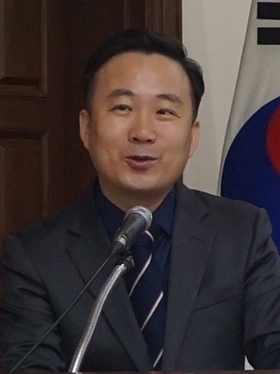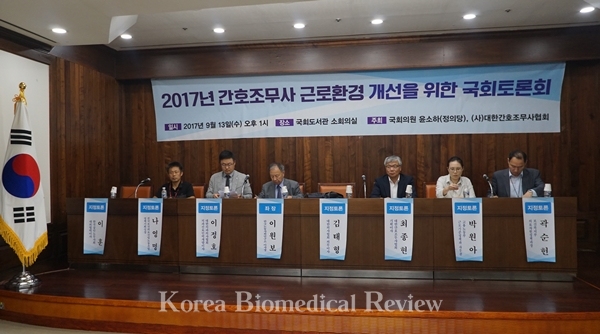Almost half of nurse assistants in South Korea receive minimum wages or less, a recent survey showed. And three out of every 10 nurse aides with more than 10 years of working experience earn minimum wages, it showed.

Hong Jeong-min홍정민, a labor attorney, presented the survey results at a National Assembly forum Wednesday, aimed to discuss how to improve working conditions for practical nurses.
Carried out on 8,664 nurse assistants from July 14-23, the survey found that they received an annual salary of 20.12 million won ($17,770), or 1.68 million won in monthly wage, on average. The monthly salary increased 60,000 won from a year ago.
Among the respondents, 13.8 percent or 1,190 nurse assistants said their wages were less than minimum wages, and 32.8 percent stated that they received minimum wages. Almost half, or 46.6 percent, were paid minimum wages or less.
The accumulated working experience did not lead to higher salaries. About 32 percent of those with more than 10 years of experience were paid minimum wages or less. A whopping 46.3 percent of those with experience of five to 10 years got paid minimum wages or less.
“According to the Minimum Wage Commission’s 2017 deliberations on minimum wages, 7.3-13.6 percent of workers received minimum wages, meaning nurse assistants were severely underpaid than other workers on average,” Hong said.

In response to the survey, labor unions called for setting up a standardized agreement form on working conditions and a standardized wage system to improve the work environment for nurse assistants.
“It is quite positive that the associations of doctors and dentists are sharing their guidelines for salary contracts and labor law guidelines to improve the work environment for nurse assistants,” said Na Young-myeong나영명, director of planning and policy at the Confederation of Labor Union of the Health and Medical Service Industries.
“We must come up with some criteria for recruiting nurse assistants by medical institutions. The integrated implementation of nursing and caregiving has set up some criteria by the type of medical institutions. But we need more detailed criteria which can reflect the characteristics of each medical institution,” Na said.
He also urged for a more detailed standardized wage system, saying hospitals should also directly hire nurse assistants as permanent employees, to improve the quality of the workforce.
However, doctors pointed out that the government should be responsible for improving working conditions for nurse assistants, noting that many doctors are financially burdened to do so. They said the state should support clinics by raising medical fees to appropriate levels.
“The minimum wage for next year will rise 16.4 percent from this year, and the government is also pushing to expand the coverage of the national health insurance. Accordingly, hospitals will have to suffer reduced incomes, and it will be harder for doctors to open clinics,” said Kim Tae-hyeong김태형, a member of the Korea Medical Association의협.
“To improve working conditions for nurse assistants, the government should enact a related law and a system to support it. Until when will the government force us to reduce our income to fill the gaps? The government should guarantee a certain level of medical charge in pushing a policy to supply more workers to the healthcare industry,” he added.
The Ministry of Health and Welfare보건복지부 said the “Special Act on Supporting Human Resources in Health and Medical Service” can be the key to improve the work environment for nurse assistants.
“I have been aware of their poor work conditions, but the survey has confirmed the greater need for improvement,” said Gwak Soon-heon곽순헌, head of the ministry’s Medical Resources Policy Division. “We need to conduct an overall inspection of medical institutions, to improve their work environment, which is possible under the special act. I hope it will pass the National Assembly.”
Regarding the guarantee of the medical payment at a certain level, he said the ministry would discuss with the medical community, as promised by President Moon Jae-in.
“We will look for ways to expand the current payment system, in which payment is based on facilities and equipment, to base its payment also on workforce and service quality,” he said.
The Ministry of Employment and Labor said it would review whether to apply the Labor Standards Act to small medical service providers with four or fewer employees.
“We will discuss applying the act to such small businesses on a phased basis,” said Park Won-ah, an official at the Labor Ministry.

